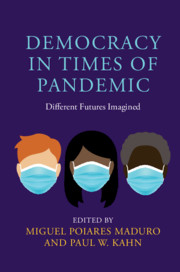Book contents
- Democracy in Times of Pandemic
- Democracy in Times of Pandemic
- Copyright page
- Contents
- Contributors
- Introduction: A New Beginning
- Part I Power
- Part II Knowledge
- Part III Citizens
- 10 COVID, Europe, and the Self-Asphyxiation of Democracy
- 11 Corona as Chance: Overcoming the Tyranny of Self-Interest
- 12 Reimagined Democracy in Times of Pandemic
- 13 Redefining Vulnerability and State–Society Relationships during the COVID-19 Crisis: The Politics of Social Welfare Funds in India and Italy
- 14 Democracy and the Obligations of Care: A Demos Worthy of Sacrifice
13 - Redefining Vulnerability and State–Society Relationships during the COVID-19 Crisis: The Politics of Social Welfare Funds in India and Italy
from Part III - Citizens
Published online by Cambridge University Press: 04 November 2020
- Democracy in Times of Pandemic
- Democracy in Times of Pandemic
- Copyright page
- Contents
- Contributors
- Introduction: A New Beginning
- Part I Power
- Part II Knowledge
- Part III Citizens
- 10 COVID, Europe, and the Self-Asphyxiation of Democracy
- 11 Corona as Chance: Overcoming the Tyranny of Self-Interest
- 12 Reimagined Democracy in Times of Pandemic
- 13 Redefining Vulnerability and State–Society Relationships during the COVID-19 Crisis: The Politics of Social Welfare Funds in India and Italy
- 14 Democracy and the Obligations of Care: A Demos Worthy of Sacrifice
Summary
There is a general consensus that COVID-19 is rapidly and radically transforming the democratic relationship between state and society. Focusing on political and legal arrangements, some argue that the virus gives a fillip to authoritarian tendencies by eroding constitutional checks and balances, while others suggest that it will reshape the state and its constitution owing to new understandings of mutual interdependence and solidarity.
We make a different argument here: Democracy is also being transformed by significant changes in the state’s fiscal arrangements and its political economy. We do so based on scrutiny of a specific type of fiscal vehicle that crystallizes and regulates state–society relationships: Special-purpose social welfare funds. These are collected pursuant to state law to tackle the vulnerability of specific social categories, such as unorganized migrant labor in the construction sector in India or the underdevelopment of certain regions in Italy. We argue that these funds are a site through which social actors, and especially the state, define social vulnerability, and more generally welfare.
- Type
- Chapter
- Information
- Democracy in Times of PandemicDifferent Futures Imagined, pp. 182 - 195Publisher: Cambridge University PressPrint publication year: 2020
- 5
- Cited by



